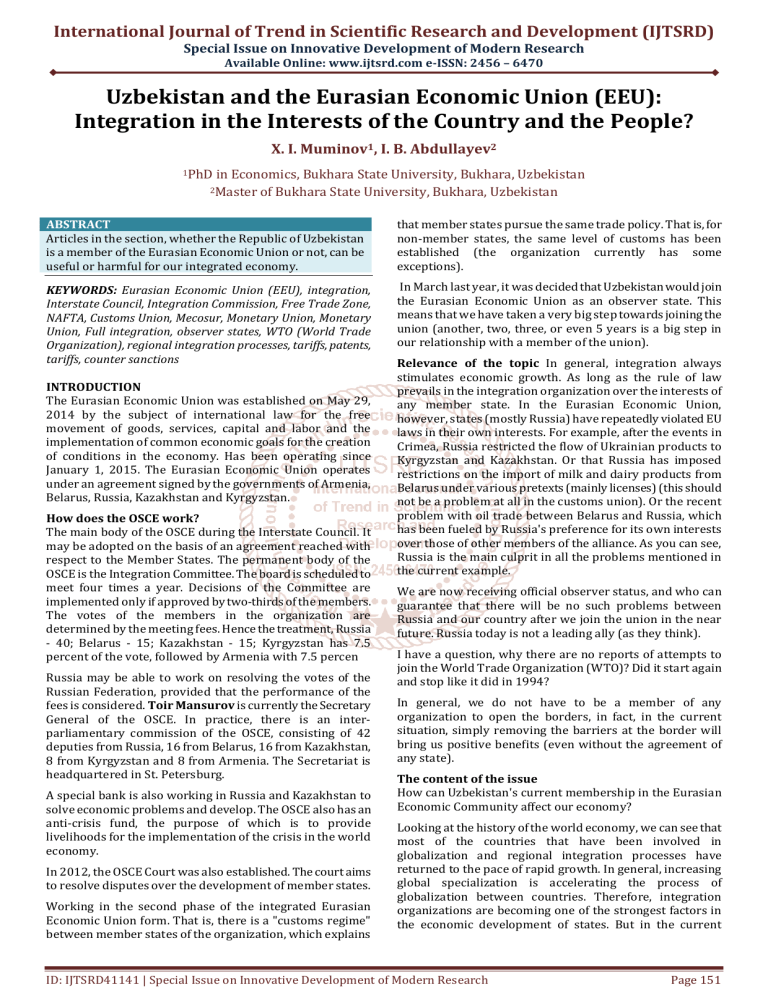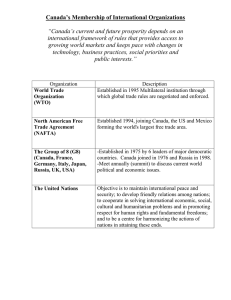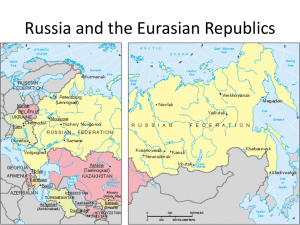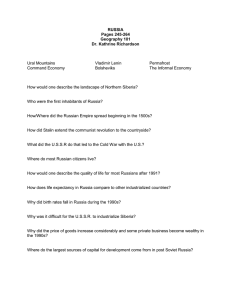
International Journal of Trend in Scientific Research and Development (IJTSRD)
Special Issue on Innovative Development of Modern Research
Available Online: www.ijtsrd.com e-ISSN: 2456 – 6470
Uzbekistan and the Eurasian Economic Union (EEU):
Integration in the Interests of the Country and the People?
X. I. Muminov1, I. B. Abdullayev2
1PhD
in Economics, Bukhara State University, Bukhara, Uzbekistan
of Bukhara State University, Bukhara, Uzbekistan
2Master
ABSTRACT
Articles in the section, whether the Republic of Uzbekistan
is a member of the Eurasian Economic Union or not, can be
useful or harmful for our integrated economy.
that member states pursue the same trade policy. That is, for
non-member states, the same level of customs has been
established (the organization currently has some
exceptions).
KEYWORDS: Eurasian Economic Union (EEU), integration,
Interstate Council, Integration Commission, Free Trade Zone,
NAFTA, Customs Union, Mecosur, Monetary Union, Monetary
Union, Full integration, observer states, WTO (World Trade
Organization), regional integration processes, tariffs, patents,
tariffs, counter sanctions
In March last year, it was decided that Uzbekistan would join
the Eurasian Economic Union as an observer state. This
means that we have taken a very big step towards joining the
union (another, two, three, or even 5 years is a big step in
our relationship with a member of the union).
INTRODUCTION
The Eurasian Economic Union was established on May 29,
2014 by the subject of international law for the free
movement of goods, services, capital and labor and the
implementation of common economic goals for the creation
of conditions in the economy. Has been operating since
January 1, 2015. The Eurasian Economic Union operates
under an agreement signed by the governments of Armenia,
Belarus, Russia, Kazakhstan and Kyrgyzstan.
How does the OSCE work?
The main body of the OSCE during the Interstate Council. It
may be adopted on the basis of an agreement reached with
respect to the Member States. The permanent body of the
OSCE is the Integration Committee. The board is scheduled to
meet four times a year. Decisions of the Committee are
implemented only if approved by two-thirds of the members.
The votes of the members in the organization are
determined by the meeting fees. Hence the treatment, Russia
- 40; Belarus - 15; Kazakhstan - 15; Kyrgyzstan has 7.5
percent of the vote, followed by Armenia with 7.5 percen
Russia may be able to work on resolving the votes of the
Russian Federation, provided that the performance of the
fees is considered. Toir Mansurov is currently the Secretary
General of the OSCE. In practice, there is an interparliamentary commission of the OSCE, consisting of 42
deputies from Russia, 16 from Belarus, 16 from Kazakhstan,
8 from Kyrgyzstan and 8 from Armenia. The Secretariat is
headquartered in St. Petersburg.
A special bank is also working in Russia and Kazakhstan to
solve economic problems and develop. The OSCE also has an
anti-crisis fund, the purpose of which is to provide
livelihoods for the implementation of the crisis in the world
economy.
In 2012, the OSCE Court was also established. The court aims
to resolve disputes over the development of member states.
Working in the second phase of the integrated Eurasian
Economic Union form. That is, there is a "customs regime"
between member states of the organization, which explains
Relevance of the topic In general, integration always
stimulates economic growth. As long as the rule of law
prevails in the integration organization over the interests of
any member state. In the Eurasian Economic Union,
however, states (mostly Russia) have repeatedly violated EU
laws in their own interests. For example, after the events in
Crimea, Russia restricted the flow of Ukrainian products to
Kyrgyzstan and Kazakhstan. Or that Russia has imposed
restrictions on the import of milk and dairy products from
Belarus under various pretexts (mainly licenses) (this should
not be a problem at all in the customs union). Or the recent
problem with oil trade between Belarus and Russia, which
has been fueled by Russia's preference for its own interests
over those of other members of the alliance. As you can see,
Russia is the main culprit in all the problems mentioned in
the current example.
We are now receiving official observer status, and who can
guarantee that there will be no such problems between
Russia and our country after we join the union in the near
future. Russia today is not a leading ally (as they think).
I have a question, why there are no reports of attempts to
join the World Trade Organization (WTO)? Did it start again
and stop like it did in 1994?
In general, we do not have to be a member of any
organization to open the borders, in fact, in the current
situation, simply removing the barriers at the border will
bring us positive benefits (even without the agreement of
any state).
The content of the issue
How can Uzbekistan's current membership in the Eurasian
Economic Community affect our economy?
Looking at the history of the world economy, we can see that
most of the countries that have been involved in
globalization and regional integration processes have
returned to the pace of rapid growth. In general, increasing
global specialization is accelerating the process of
globalization between countries. Therefore, integration
organizations are becoming one of the strongest factors in
the economic development of states. But in the current
ID: IJTSRD41141 | Special Issue on Innovative Development of Modern Research
Page 151
International Journal of Trend in Scientific Research and Development (IJTSRD) @ www.ijtsrd.com eISSN: 2456-6470
situation, what are the consequences of Uzbekistan's
membership in the Organization?
Advantages: First of all, customs duties will be reduced at
the border for products entering our country. As a result, the
prices of goods and services in the domestic market will
naturally fall. Consumers will benefit from this, as they will
be able to buy more expensive products at a lower price, as
well as increase their choice. In the short run, this will lead to
a reduction in the market segment size of manufacturers (as
a result of increased external competition). In the long run,
the competitiveness of domestic producers will increase and
exports will increase in areas with a relative advantage.
Areas that do not have a relative advantage may disappear
(not all). It is natural that there will be positive changes in
the logistics system.
Disadvantages: First, the Russian effect. Historically, at a
time when European countries were imposing sanctions on
Russia, Kazakhstan, a member of the organization, also
received sanctions from several countries. In general, the
extent to which Russia participates in the political process
will have a direct impact on the organization's activities in
the future. In other words, the imposition of sanctions on
Russia by other major leaders will affect other members of
the organization.
Membership in the organization could increase Russia's
influence in our economy. This will more or less undermine
economic freedom.
If we look at the history of the Organization, we can see that
Russia has repeatedly violated the agreements reached
within the Organization. The recurrence of such cases in the
future will lead to the deterioration of the position of the
organization (in practice, will lead to the failure of the
organization). Or the actions of the Republic of Belarus: at
the time of the EU sanctions against Russia, the Republic of
Belarus took advantage of this situation, that is, no sanctions
were imposed on Belarus from Europe.There have been
many cases of the Republic of Belarus importing European
products (many of which have been converted to “Made in
Belarus”) into Russia through Belarus (which has caused
significant damage to the Russian government).
In addition, we have competing countries in the organization,
which are mainly engaged in the export of raw materials. In
this regard, the opening of borders to these states may not
lead to any positive situation in practice.
Conclusions and recommendations
In my opinion, the fact that Uzbekistan is joining the
Eurasian Economic Union as an observer is the right
decision. The issue of migrants has often been at the
forefront of this alliance. I do not believe that joining the
union will ease the situation for migrants. But I expected the
decision not to join to make things worse for them. We know
Russian politicians who do not tolerate any inferiority in
achieving their goals. After the sharp decision not to join the
union, there was a growing pressure on our migrants in
Russia. And given Russia's influence in Central Asia, we could
expect the pressure to be more than that. I think (if I think
so) that this decision was made wisely and will help the
national economy gain time until it recovers somewhat.
Will joining the alliance make accession to the WTO easier or
harder?
One of the main conditions for accession to the WTO is the
reduction of import tariffs. From this perspective, joining the
union will accelerate accession to the WTO. Why? At present,
the average tariff rate in the country is 20% (if you add other
duties, it will be higher). The average tariff in the Eurasian
Economic Union is about 6%, and the average tariff rate in
the WTO member states is about 9%. tariffs approach 6%).
This will automatically eliminate the main problem of
accession to the WTO. That is, in theory, joining the union
will make it easier (or faster) to join the WTO.
How will joining the union affect exports and imports?
The conclusion that joining the union will dramatically
increase exports is not true. This is because the free trade
agreement between the countries of the former Soviet Union
has been in force since 2011. This means that until now,
tariffs on exports to the countries of the Eurasian Economic
Union have not been significantly affected. Joining the union
may lead to a slight reduction in tariffs (a very small change),
but it will not lead to a sharp increase in exports. However,
import duties are the same not only for the member states of
the Union, but also for other countries. That is, under the
terms of the customs union, goods entering the territory of
the union (regardless of the territory of the state) are subject
to the same tariffs. For example, if a product from China
enters the territory of Russia with a 5% duty, it means that it
enters Uzbekistan with the same duty. Given the current
level of tariffs in our country, joining the union will provide a
huge incentive for imports in the short term. Of course, this
process can seriously hurt domestic producers. Consumers,
on the other hand, benefit from having the opportunity to
buy cheaper than before. From an economic point of view,
joining a union increases the well-being of society as a whole.
Because the damage to domestic producers and the state
budget will be less than the benefits to consumers.
However, these analyzes do not lead to the conclusion that it
is necessary to join the union, because the above conclusions
are based only on purely economic calculations. It does not
take into account the fact that a state violates the laws of the
Union in its own interests, restricts trade and the political
consequences. Maybe the political consequences will be
more costly for our country than the economic benefits, and
if so, joining the union will not be justified. The issue of
joining this union is the work of more politicians, and it is
impossible to form a complete picture with economic
calculations alone.
List of used literature:
[1] https://centrasia.org/news.A.php?st=1570799400&t
g_rhash=b71ef5de4df03e
[2] https://russian.eurasianet.org/node/60611
[3] https://daryo.uz/2020/04/04/ozbekiston-senatiyeoii-bilan-hamkorlik-masalasini-organishgakirishdi/
[4] https://www.institutfuersicherheit.at/did-theeurasian-economic-union-eaeu-create-a-commonmarket-for-goods-services-capital-and-labor-withinthe-union/
[5] https://www.export.gov/apex/article2?id=Uzbekista
n-Import-Tariffs
[6] https://berlin-economics.com/wpcontent/uploads/2018-05-29_PresentationEAEU_Moscow.pdf
[7] https://rg.ru/2014/11/12/duma-patenti.html
[8] https://ria.ru/20140529/1009667833.html
ID: IJTSRD41141 | Special Issue on Innovative Development of Modern Research
Page 152







